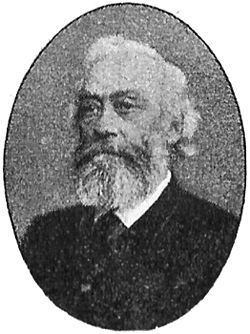Martin Wiberg
Martin Wiberg | |
|---|---|
 | |
| Born | 4 September 1826 Viby, Kristianstad, Scania, Sweden |
| Died | 29 December 1905 (aged 79) |
| Nationality | Swedish |
| Occupation | Inventor |
Martin Wiberg (4 September 1826 – 29 December 1905) was a Swedish inventor. He enrolled at Lund University in 1845 and became a Doctor of Philosophy in 1850.


He is known as a computer pioneer for his c. 1859 (1857-1860) invention of a machine the size of a sewing machine that could print logarithmic tables (first interest tables appeared in 1860, logarithmic in 1875). The logarithmic tables were subsequently published in English, French and German in 1876. The device was investigated by the French academy of science which also wrote an extensive report on it in 1863.[1] The device was inspired by the similar work done by Per Georg Scheutz[2] (had the same capacity: 15-digit numbers and fourth-order differences) and has similarities with Charles Babbage's difference engine. (Scheutz machine was based on the difference engine).[3] The device is preserved at Tekniska museet[4] (The Technical Museum) of Sweden in Stockholm. Wiberg failed to sell his machine, and also failed to sell the output tables due to their bad looks.[5][6][7]
Apart from this invention, Wiberg invented numerous other devices and gadgets, among these a cream separator and a pulse jet engine. None of these were commercially successful.[5]
See also
[edit]References
[edit]- ^ "Original Documents on the History of Calculators". ajmdeman.awardspace.info (in French). C. Delaunay, "Rapport sur une machine a calculer présentée par M. Wiberg", Comptes Rendus des Séances de l'Académie des Sciences 56 (1863) 330-339. Retrieved 2017-08-26.
{{cite web}}: CS1 maint: others (link) - ^ Campbell-Kelly, Martin (2003-10-02). The History of Mathematical Tables: From Sumer to Spreadsheets. pp. 131–132: Oxford University Press. ISBN 9780198508410.
{{cite book}}: External link in|location= - ^ Merzbach, Uta C.; Zoology, Smithsonian Contributions To; Ripley, S. Dillon; Merzbach, Uta C. First Printing Calculator. pp. 32–33. CiteSeerX 10.1.1.639.3286.
- ^ "Räknemaskin" [Calculator]. digitaltmuseum.se (in Swedish). Retrieved 2017-08-26.
- ^ a b Nordisk familjebok, Uggleupplagan, page 202
- ^ Hallberg, Tord Jöran: IT-Gryning - Svensk datahistoria från 1840- till 1960-talet, page 17, ISBN 978-91-44-03501-7
- ^ "History of Computers and Computing, Babbage, Next differential engines, Wiberg". history-computer.com. Retrieved 2017-08-26.
Further reading
[edit]- Wiberg, Helgo. "Några av Martin Wibergs uppfinningar – Digitala modeller" [Some of Martin Wiberg's Inventions - Digital Models]. digitalamodeller.se (in Swedish). Daedalus 1955. Retrieved 26 August 2017.
- "Vår familjehistoria" [Our family history]. bjaraslakten.se (in Swedish). Family history. In "Text-dokument" there's a link to video showing Wiberg's difference engine with commentary in English. Retrieved 26 August 2017.
{{cite web}}: CS1 maint: others (link) - Rittsel, Pär. "Martin Wiberg, snillet från Lund". IDG.se (in Swedish). Google Translation to English. Retrieved 26 August 2017.
{{cite web}}: External link in|others=


 French
French Deutsch
Deutsch